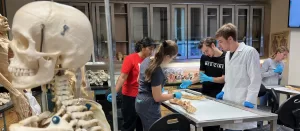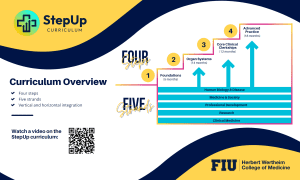|
Getting your Trinity Audio player ready...
|

The FIU Herbert Wertheim College of Medicine is launching a new curriculum this fall with the incoming Class of 2027. The StepUp Curriculum builds on the college’s already successful community-based model designed to address the changing health care landscape and prepare students to be well-rounded physicians of the future.
The new program of studies is intended to be more integrated, experiential and clinically immersive — as well as grounded in best practices for adult learning. The ultimate goal is to nurture self-directed lifelong learners.
“We are building on a strong foundation. Our curriculum has done very well,” says Dr. Juan Cendan, dean of the college. “[But] we are continuously looking for ways to improve. And we felt we had opportunities to improve while keeping our unique characteristics.”
Led by Dr. Rebecca Toonkel, associate dean of curriculum and medical education, the college examined every course syllabus, spoke to professors, held town halls to hear from students and reviewed peer institutions. Administrators looked for redundancies that could be eliminated, order and timing of learning objectives and areas in the curriculum the community felt could be approached differently.
The result: a medical school experience that prioritizes student well-being and helps them make connections across the curriculum.
Students in the StepUp curriculum will continue to work in interprofessional teams to provide household-based care throughout the South Florida community as part of the college’s signature Green Family Foundation NeighborhoodHELP program.
In addition, the college is building a new 7,000-square-foot anatomy and 3D printing lab where students will engage in hands-on dissection and simulated learning supported by the latest developments in anatomy teaching. The facility is slated for completion in early 2024.
“We believe this hands-on approach will better prepare our students for their clinical rotations and, ultimately, for their careers as physicians,” Toonkel says.
Specifically, more exposure to cadavers, students say, is a major improvement that they feel will make them more confident and competitive as they look at residency programs.
“Medicine is a science but also an art,” says medical student Christina Taragjini, class of 2026. “There’s a certain appreciation you have for the human body that will be better integrated into the new curriculum with more experience with cadavers.”
Ultimately, students, faculty and stakeholders agree: the StepUp curriculum will produce better-prepared and emotionally stronger physicians ready to face the challenges of the nation’s health care.
Medical students will continue to practice clinical skills in a controlled environment (before treating patients) at the state-of-the-art Albert and Debbie Tano Medical Simulation Center.
“We are being very intentional to best support student wellness,” Toonkel says. “This is a student-centered, community-based and integrated approach to medical education. Cendan adds that student input was critical. “We wanted to engage students at every level.”
“It’s great to see leadership taking action based on student feedback,” says Monica Reyes ’18, president of the class of 2023. “We were involved early on, participating in curriculum meetings.”
STEP 1
The first step of the StepUp Curriculum is the Foundations step, which consists of one semester of foundational education that is completely pass/fail.
During this time, students will be given the opportunity to adjust to medical school and experiment with new learning and studying techniques knowing that their grades in introductory courses will not be included in their GPA calculation or eventual class rank. Administrators hope students will use this time to figure out what works for them and what doesn’t as well as gauge their strengths and weaknesses.
“We wanted to minimize the shock of entering med school,” Cendan says. “It doesn’t have to be a pressure cooker.”
Joey Luzarraga — who is finishing up his first year at the college — is a huge proponent of the new curriculum. The FIU medical student community of just 120 students is very close. These changes, he says, will only tighten their bonds.
“Competition will not be so intense. We can work together to truly understand the material from the start and not feel so rushed,” Luzarraga says.
“Making this change for the incoming class is the best thing they can do,” Taragjini adds. “The field of medicine is moving to be more holistic, less cutthroat, more about deep understanding. ”
STEP 2
Step 2 of the new curriculum, the Organ Systems step, starts at the end of the first semester and extends to the end of the second year. During this period, students will be immersed in an integrated approach to the organ systems — embryology, anatomy, physiology, pathophysiology, pathology and pharmacology — all integrated with clinical context.
“I’m happy for the upcoming class to have the opportunity to really understand the big picture before digging deeper,” Reyes says. “They’ll learn the material once and for all really well instead of three times throughout but not as deep.”
Each of the five organ systems blocks consists of two to three units and lasts 10 to 12 weeks. The Organ Systems step is also pass/fail, but students will have the opportunity to demonstrate academic excellence through the attainment of academic distinction based on GPA.
STEPS 3 & 4
During the yearlong “Step 3”, Clinical Medicine, students will complete their core clinical rotations. And finally, during “Step 4,” Advanced Clinicals, students will complete experiences in emergency medicine, geriatrics and research scholarship, and participate in the sub-internship experience.
The new StepUp curriculum is horizontally and vertically integrated with five strands focusing on human biology and disease, medicine and society, professional development, research and clinical medicine.
Toonkel concludes, “At the college, our goal is to ensure our students achieve competency without sacrificing wellness!”





